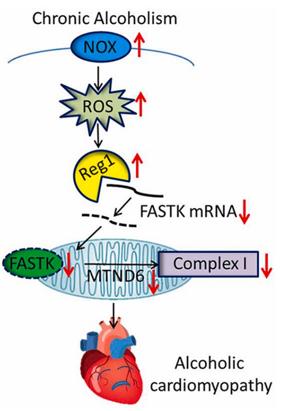What is FASTK Protein
FASTK, or Fas-activated serine/threonine kinase, is a crucial protein that plays a pivotal role in cellular processes. Also known as FASTKD1, it is encoded by the FASTKD1 gene. Synonyms for FASTK include FAST kinase domain-containing protein 1 and Fas-activated serine/threonine kinase domain-containing protein 1.
FASTK Protein Structural Characteristics and Classification
Belonging to the FAST kinase domain-containing (FASTKD) protein family, FASTK is essential for maintaining mitochondrial function. These proteins are characterized by a kinase domain and RNA-binding motifs. FASTK, in particular, possesses a unique combination of domains, including a K-homology (KH) domain and a RAP domain. This structural makeup underscores its significance in RNA metabolism and cellular homeostasis.
Recent Research Advances about FASTK Protein
Recent research has shed light on the multifaceted roles of FASTK within the cell. Studies have highlighted its involvement in the regulation of mitochondrial RNA processing, specifically in the maturation of mitochondrial tRNAs. Moreover, FASTK has been implicated in the maintenance of mitochondrial DNA integrity, linking it to the overall health of the cell.
FASTK Biological Functions and Molecular Mechanisms
FASTK's biological functions are intricately tied to its role in mitochondrial RNA processing and metabolism. It acts as a key player in the maturation of mitochondrial tRNAs, ensuring their proper functionality in the translation machinery. Additionally, FASTK has been implicated in the regulation of mitochondrial gene expression, impacting the overall energy production and cellular respiration.
At the molecular level, FASTK exerts its influence through RNA-binding interactions. Its KH domain facilitates binding to specific RNA sequences, allowing it to participate in the processing and stabilization of mitochondrial RNAs. The RAP domain, on the other hand, is involved in protein-protein interactions, contributing to the formation of complexes that modulate mitochondrial gene expression.

Figure 1. Oxidative stress-induced FASTK mRNA degradation in alcoholic cardiomyopathy. (Zhang F, et al., 2021)
FASTK Related Signaling Pathway
The signaling pathways involving FASTK are complex and interconnected. Notably, its association with mitochondrial function implicates it in pathways related to cellular energetics and stress responses. Research suggests that FASTK may respond to cellular stress signals, modulating its activity to ensure the maintenance of mitochondrial integrity and function.
FASTK Related Diseases
Understanding the implications of FASTK dysregulation is critical in deciphering its connection to various diseases. Recent research has identified links between FASTK and mitochondrial disorders, particularly those affecting energy metabolism. Dysfunctional FASTK has been associated with disruptions in mitochondrial RNA processing, leading to defects in mitochondrial translation and energy production.
FASTK's Applications in Biomedicine
- Diagnostic Development
Given its central role in mitochondrial RNA processing, FASTK holds promise as a diagnostic marker for mitochondrial disorders. Detection of aberrant FASTK levels or activity could serve as an indicator of mitochondrial dysfunction, aiding in the early diagnosis of related diseases.
- Vaccine Development
Understanding the molecular mechanisms governed by FASTK provides a basis for exploring its potential in vaccine development. Targeting FASTK-related pathways could offer new avenues for designing vaccines aimed at bolstering mitochondrial function and cellular resilience.
- Therapeutics
The intricate involvement of FASTK in cellular processes makes it an attractive target for therapeutic interventions. Modulating FASTK activity could potentially ameliorate mitochondrial disorders and enhance cellular function. Small molecules or gene therapies targeting FASTK-related pathways may emerge as novel therapeutic strategies in the future.
Recommended Products
| Cat.No. | Product Name | Species | Source (Host) | Tag |
|---|---|---|---|---|
| FASTK-1402H | Active Recombinant Human FASTK (Active), GST-tagged | Human | Sf9 Insect Cell | GST |
| FASTK-801H | Recombinant Human FASTK, GST-tagged | Human | Sf9 Insect Cell | GST |
| FASTK-824H | Recombinant Human Fas-activated Serine/Threonine Kinase, T7-tagged | Human | E.coli | T7 |
| FASTK-3859H | Recombinant Human FASTK Protein, GST-tagged | Human | Wheat Germ | GST |
| FASTK-3315H | Recombinant Human FASTK Protein, Myc/DDK-tagged, C13 and N15-labeled | Human | HEK293T | Myc/DDK |
| FASTK-02H | Recombinant Human FASTK Protein, Myc/DDK-tagged | Human | HEK293T | Myc/DDK |
| FASTK-721H | Recombinant Human FASTK Protein, His-tagged | Human | E.coli | His |
| FASTK-01H | Recombinant Human FASTK Protein, His-tagged | Human | E.coli | His |
| FASTK-4863HF | Recombinant Full Length Human FASTK Protein, GST-tagged | Human | In Vitro Cell Free System | GST |
| Fastk-2957M | Recombinant Mouse Fastk Protein, Myc/DDK-tagged | Mouse | HEK293T | Myc/DDK |
Reference
- Zhang F, et al. Accelerated FASTK mRNA degradation induced by oxidative stress is responsible for the destroyed myocardial mitochondrial gene expression and respiratory function in alcoholic cardiomyopathy. Redox Biology. 2021, 38: 101778.

